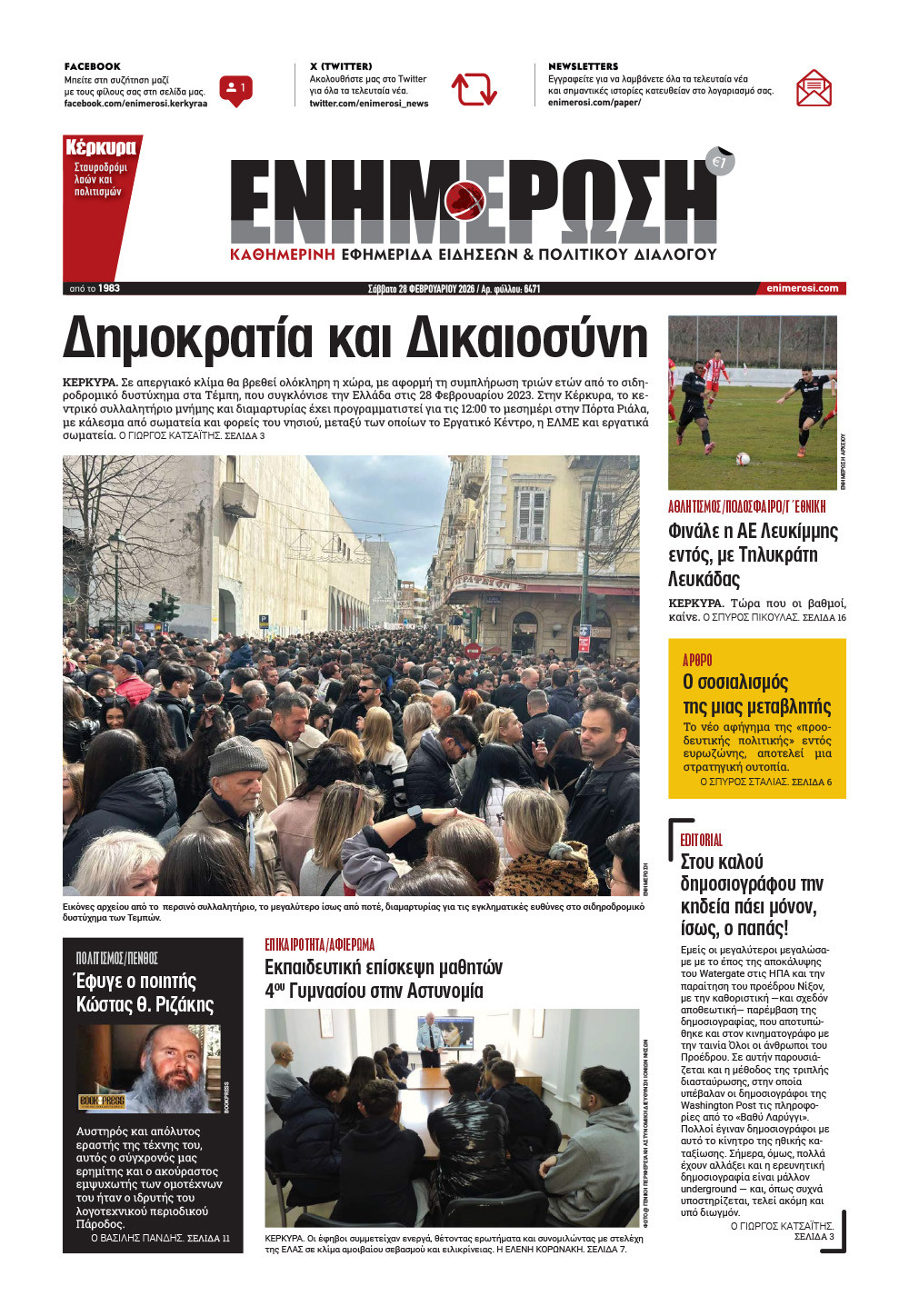Hellenic Federation of Hoteliers President speaks to Enimerosi - We want better cooperation with the government and local authorities

The president of the Hellenic Federation of Hoteliers, Yiannis Chatzis, in an exclusive interview with Enimerosi and Giorgos Katsaitis, answered questions about everything and everyone.
He spoke about the good as well as the challenging aspects. How he sees the development of tourism—or even overtourism—in the coming years, how the lack of infrastructure will be addressed, what will happen with short-term rentals, why collective labour agreements are delayed, and what will be done about the increases in municipal taxes.

Year after year, arrival numbers are increasing. What should we expect from the next season?
Indeed, in 2024, we saw a 9.7% increase in inbound tourism, according to data from the Bank of Greece. For 2025, we have encouraging indications based on current pre-booking data. However, these pre-bookings come with significant discounts, and we still need to see how demand will shape up in the coming period.
The general outlook suggests another positive year in terms of arrivals. However, focusing solely on arrival numbers does not provide a complete picture of the tourism reality. While record-breaking numbers are being discussed, qualitative data raise concerns—for example, the fact that, according to the Bank of Greece, the average expenditure per trip decreased by 5.4%. And this is happening in an environment of soaring operational costs. So, it is clear that increased arrivals do not automatically translate into profits for hotels.
According to a recent ICAP CRIF study, while the turnover of hotel businesses has grown, the rise in operational and financial expenses has led to a significant 16.3% decrease in net pre-tax profits in 2023. Therefore, complacency—or even celebration—is not the appropriate response. We need proactive policies to improve qualitative factors and ensure the long-term sustainability of hotel businesses, particularly smaller establishments that are increasingly struggling to meet their rising obligations.
Do you agree with the claims of overtourism in Greek destinations?
The discussion about overtourism is misguided and not based on real data. The scale of tourism in Greece is vastly different from destinations where overtourism is a genuine problem. Here, the conversation is fueled by generalisations, oversimplifications, and snapshot images that create misleading impressions. If ten cruise ships dock simultaneously at any port in the world, there will be congestion. But we should not misinterpret momentary mismanagement of tourist flows as overtourism. We must stop shooting ourselves in the foot.
How do you address the contrast between the positive arrival numbers and the ongoing infrastructure crisis in many destinations (water, waste management, roads, traffic)?
This is the “gap” we must close in time before it undermines the momentum and future of Greek tourism. The answer to major challenges—such as extending the tourist season, attracting higher-income visitors, and reducing regional disparities in tourism activity—lies in a large-scale plan for public infrastructure. This requires collaboration and partnerships between the public and private sectors, bringing added value to citizens’ daily lives, the country’s image, and its tourism product. It also demands the rational use of available European funding.
We must take swift, targeted steps to upgrade infrastructure rather than using “overtourism” as an excuse for deficiencies or declining performance. It is also irrational to claim that high demand is to blame for destinations’ inability to manage their daily operations properly. The state, local authorities, and the private sector must look forward and take bold action.
Should restrictions be placed on short-term rentals through tourism zoning regulations?
The Hellenic Federation of Hoteliers has raised serious objections to how this issue has been handled so far. Even with the recent legal framework, as I have pointed out, the Greek government has tried to “square the circle” without clarifying whether short-term rentals are a business tourism activity—thus requiring strict regulations like those for legally operating tourist accommodations—or a form of the sharing economy, in which case basic standards should be paired with strict time and volume restrictions. The issue still needs a clear resolution, as the current situation exacerbates the housing crisis and triggers serious social consequences.
What are your main demands from the government?
The key long-standing demand is recognising the tourism sector’s contribution. We support public revenue, directly contribute over €11 billion to GDP, and create jobs for over 200,000 workers, with the hotel industry ranking third in earnings among the country’s ten largest sectors. Additionally, we are the backbone of local economies nationwide, with 90% of hotel-generated GDP coming from regional areas. According to the Bank of Greece, net revenues from travel services in 2024 offset 57.8% of the goods trade deficit and accounted for 84.2% of total net service revenues.
This contribution is not always properly acknowledged. We often face sudden policy changes and decisions made without consultation, as seen with the steep increases in the Resilience Fee and municipal accommodation taxes. Hotels are overtaxed in an environment of inflation, unfair competition, and inadequate infrastructure. We cannot keep fighting alone when tourism benefits everyone. All stakeholders must focus on the Greek hotel sector, sit down at the table, and find real solutions to long-standing issues that trouble us.
Will you participate in negotiations for the new collective labour agreement? Why haven’t you done so up to now?
The Hellenic Federation of Hoteliers has always demonstrated its commitment to dialogue and collective negotiations. The collective agreement governing wages and working conditions in the hotel industry has been in effect for over 50 years and remained intact even during the difficult years of economic austerity. Although negotiations for the new agreement have already begun, out of respect for the collective bargaining process, I cannot provide further details at this time.
What conditions are necessary for better cooperation with local authorities?
Good accounts make good friends. That’s why we asked the Minister of the Interior for full transparency and a detailed breakdown of how municipal taxes are allocated and spent. We made this request because we faced massive increases in municipal taxes for 2025 across Greece. Once again, hotels are seen as an “easy solution” to local governments’ financial problems, without the legally required reciprocal benefits.
More concerning is that some municipalities are now looking for additional unjustified charges, such as the Municipality of Vari–Voula–Vouliagmeni imposing a special sustainability fee. We want open dialogue and cooperation with local authorities. However, this must be a two-way street—municipalities must also seek cooperation, as decisions like these undermine trust.
How do you envision Greek tourism in ten years?
Greece has everything it takes to be a global leader in tourism. But this requires collective and responsible action toward a sustainable, innovative, and resilient tourism model with a focus on quality. And quality should cater to a broad range of travellers, not just luxury markets. In ten years, Greece can be a global leader in high-quality tourism—if we believe in this vision and put in the work necessary to achieve it. This ambition is well within our capabilities.
Who is Yiannis Chatzis?

Yiannis Chatzis was born and raised in Rhodes. He graduated in 2008 from the Athens University of Economics and Business (AUEB) and continued his postgraduate studies, first in Paris at ESSEC Business School and then in London at the London School of Economics (B.Sc., MBA, M.Sc.). In 2016, he was awarded the CFA Charterholder title.
He is the president and co-owner of the Blue Sea Resort Collection, a hotel group based in Rhodes. The company operates seven hotel units with a total capacity of 4,000 beds under five different brand names. He also serves as the First Vice President of the Greek Tourism Confederation (SETE).
GIORGOS KATSAITIS












